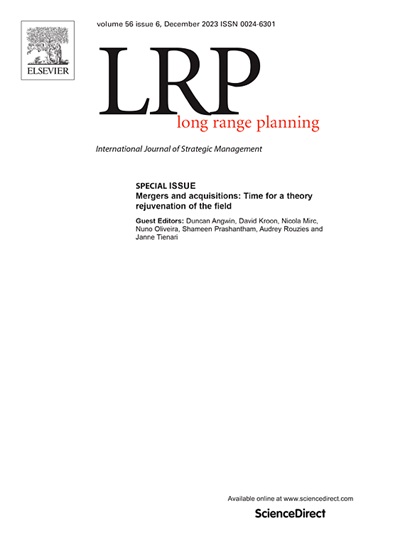公司上市模式和外资资本市场责任对其在美国管辖权选择的影响
IF 6.3
2区 管理学
Q1 BUSINESS
引用次数: 0
摘要
尽管全球资本市场迅速一体化,但企业在海外融资时往往面临着资本市场外债(CMLOF)。鉴于CMLOF源于外国公司在东道国缺乏合法性,我们研究了外国公司和国内公司的上市模式是否以及如何不同地影响它们采用合法的国内商业实践(即组织同构),以推进提出组织同构作为公司合法性缺陷补救措施的制度理论。在两种主要的上市模式中,反向并购(RM)被认为不如首次公开募股(ipo)合法。因此,我们认为,已经遭受CMLOF的外国公司在使用不太合法的模式(RM)时,更需要合法性来向投资者保证其生存能力,而国内公司在使用更合法的模式(IPO)时更积极地寻求合法性,这提供了更好的机会来筹集大量资金。通过将特拉华州公司注册作为一种合法的商业实践,并分析2007年至2016年美国的IPO和RM交易,我们发现了实证支持我们的论点。讨论了贡献和局限性。本文章由计算机程序翻译,如有差异,请以英文原文为准。
The impact of firms’ going public mode and capital market liability of foreignness on their choice of jurisdiction in the United States
Despite the rapid integration of global capital markets, firms often face capital market liability of foreignness (CMLOF) when raising capital abroad. Given that CMLOF stems from foreign firms' lack of legitimacy in host countries, we examine whether and how foreign and domestic firms’ modes of going public differently affect their adoption of legitimate domestic business practices (i.e., organizational isomorphism) to advance institutional theory that proposes organizational isomorphism as a remedy for the legitimacy deficit of firms. Among the two major modes of going public, reverse mergers (RM) are considered less legitimate than initial public offerings (IPOs). Thus, we argue that foreign firms already suffering from CMLOF require legitimacy even more to assure investors of their viability when using a less legitimate mode (RM), whereas domestic firms seek legitimacy more actively when using a more legitimate mode (IPO) that presents better opportunities to raise substantial capital. Focusing on Delaware incorporation as a legitimate business practice and analyzing IPO and RM deals in the United States from 2007 to 2016, we found empirical support of our arguments. Contributions and limitations are discussed.
求助全文
通过发布文献求助,成功后即可免费获取论文全文。
去求助
来源期刊

Long Range Planning
Multiple-
CiteScore
13.00
自引率
7.10%
发文量
75
期刊介绍:
Long Range Planning (LRP) is an internationally renowned journal specializing in the field of strategic management. Since its establishment in 1968, the journal has consistently published original research, garnering a strong reputation among academics. LRP actively encourages the submission of articles that involve empirical research and theoretical perspectives, including studies that provide critical assessments and analysis of the current state of knowledge in crucial strategic areas. The primary user base of LRP primarily comprises individuals from academic backgrounds, with the journal playing a dual role within this community. Firstly, it serves as a platform for the dissemination of research findings among academic researchers. Secondly, it serves as a channel for the transmission of ideas that can be effectively utilized in educational settings. The articles published in LRP cater to a diverse audience, including practicing managers and students in professional programs. While some articles may focus on practical applications, others may primarily target academic researchers. LRP adopts an inclusive approach to empirical research, accepting studies that draw on various methodologies such as primary survey data, archival data, case studies, and recognized approaches to data collection.
 求助内容:
求助内容: 应助结果提醒方式:
应助结果提醒方式:


